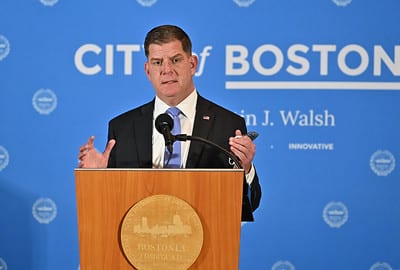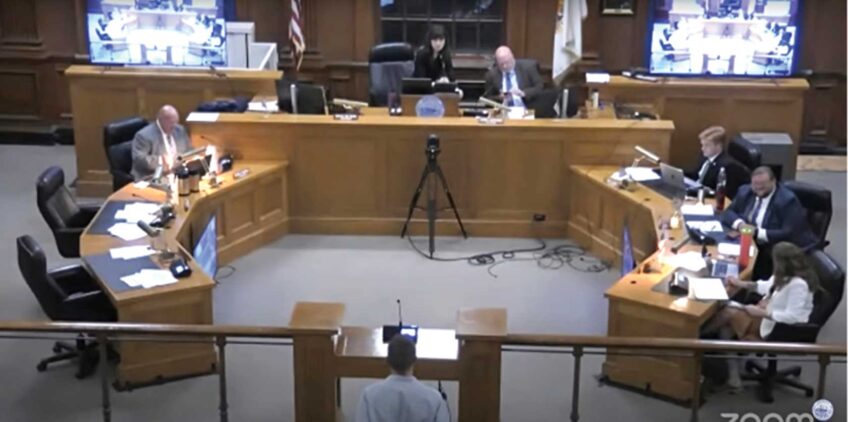Black, Latino groups file federal complaint against Walsh administration over contracting
Groups concerned few contracts going to minority firms

A coalition of minority business advocates filed a complaint against the city of Boston Monday, alleging that the city discriminates against Black and Latino-owned businesses in its $2.1 billion in annual contracting.
The complaint, filed with the U.S. Department of Justice and U.S. Department of Transportation, alleges that despite years of advocacy from advocates for Black and Latino businesses, the city has “continually failed to act, contenting itself with issuing meaningless executive orders and statements that have done nothing to change circumstances on the ground.”
Last week, city officials released a disparity study, a document that compares the number of businesses owned by people of color and women that are qualified and willing to take on city government contracts to the actual number who were able to work on such contracts. Just 1.2% of the city’s contracting dollars went into such businesses, the study found.
Mayor Martin Walsh announced Thursday an executive order defining goals to increase the share of contracting dollars going to minority- and women-owned businesses.
“With the study now complete, we look forward to enacting meaningful reform and policy changes that will bolster opportunities for underrepresented businesses,” Walsh said in a statement.

Celina Barrios-Millner, who leads the Equity and Inclusion Unit within the Mayor’s Office of Economic Development, speaks to
reporters about the city’s new minority contracting goals. PHOTO: ISABEL LEON, MAYOR’S OFFICE
Under the new goals, 15% of contracting dollars will go to women-owned businesses and 10% to businesses owned by people of color.
Despite Walsh’s announcement, representatives of the groups that filed the complaint — Amplify Latinx, the Black Economic Council of Massachusetts (BECMA) and Lawyers for Civil Rights — say they do not plan on withdrawing their complaint.
City officials could have taken concrete steps to improve its contracting allocation well before the study was undertaken three-and-a-half years ago.
Segun Idowu, executive director of BECMA, noted that many state and federal agencies have for years been splitting large contracts into smaller pieces, which allows the smaller businesses owned by people of color to bid competitively. Yet Walsh and Chief of Economic Development John Barros have not taken similar steps, despite repeated requests Idowu and others have made for that type of change.
“We have literally been saying the same thing in every single meeting we’ve had with Mayor Walsh and John Barros,” he said. “They keep saying they’re going to do something about this — and yet here we are.”
Lawyers for Civil Rights Executive Director Ivan Espinoza-Madrigal said the groups’ complaint will give business owners of color the opportunity to weigh in on city policy, noting that the Walsh administration’s executive order gives a “vague and uncertain timeline” and leaves out information on how objectives will be met.
“The Walsh administration has acted unilaterally to create an executive order that doesn’t completely address the problem,” Espinoza-Madrigal said. “The devil, here, is in the details. What Mayor Walsh released today is much too vague to give us comfort that the allegations of discrimination will be addressed.”
In addition to setting goals, Walsh’s executive order requires the city to track progress on meeting its goals during the annual budgeting process. Each department that issues contracts will be required to disclose whether or not it met its goals and provide details on how it plans to meet them in the next year. The order also calls for the establishment of a supplier diversity program to help departments meet their goals.
Walsh, who is expected to leave city government to head the Department of Labor under the Biden administration, will not likely remain in Boston to oversee the implementation of the order. Barros is considering a run for the mayor’s seat.
The complaint was filed with the federal Department of Justice because the agency has traditionally taken on such cases and has expertise in discrimination complaints, Espinoza-Madrigal said. It was filed with the federal Department of Transportation because the city has ongoing contracts with the agency that are subject to federal civil rights laws.
“It makes a lot of sense for them to review the city’s work,” he said.
Amplify Latinx Executive Director Rosario Ubiera-Minaya said the complaint will keep the concerns of Black and Latino businesses at the top of the city’s agenda even as the mayoral role shifts to Council President Kim Janey.
“What we are hoping is that this brings attention and bold leadership to resolve the situation,” she said. “We’re looking forward to working with Councilor Janey when she takes over as acting mayor.”







